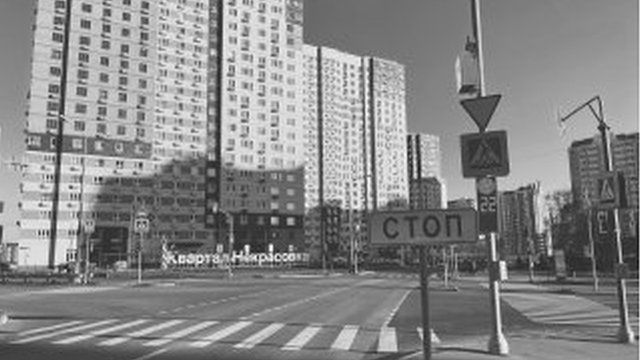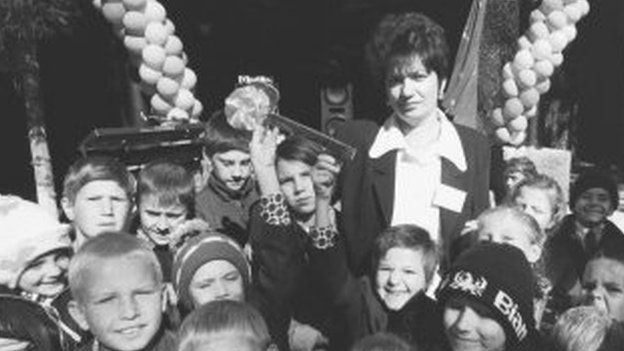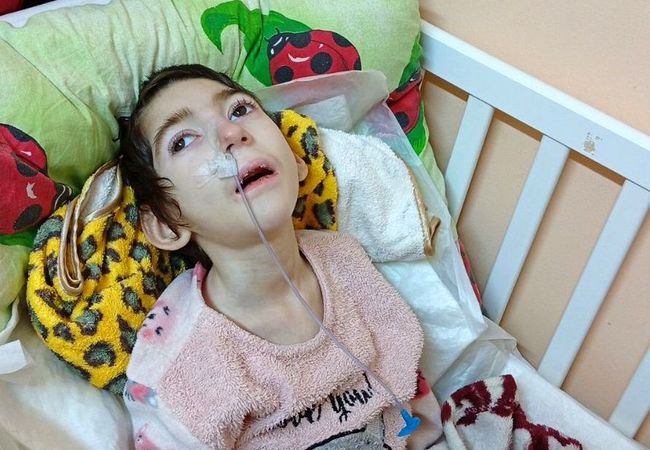
Do not "rot into PNI"
Darina (the name has been changed, the woman hides her boarding past, in Russia the topic of orphanhood is still stigmatized - ed.) Drags a baby carriage into the entrance of a five-story building in Kuntsevo. The five-story building is surrounded by new bright skyscrapers: the west of Moscow is being actively built up, but Darina's house has remained intact and there are no plans for its resettlement yet. Darina is pleased with this, although the old fund lacks some amenities, such as an elevator or a wheelchair ramp. She place the stroller in a small dressing room and gently wipes the wheels with a special cloth that lies right there. An elderly woman looks out from the door opposite, greets me warily and asks if I need help with the child. Mila, Darina's daughter, merrily runs to her, and we enter Darina's empty and ascetic apartment with a bright spot in the corner - Mila's bed is bright bright pink and there is the same pink castle next to it.
"Veronika Matveyevna has been taking care of me from the very beginning," Darina explains, taking off her shoes and placing them on the doormat in the corner. - She, in my opinion, did not even know my story yet, but she decided to help, although at first she cursed more.
Darina's story is her childhood in a home for disabled children (DDI), first and a neuropsychiatric boarding school (PNI) later. Growing up in a dysfunctional Moscow family, a girl at the age of five broke her spine - and this became the final point in the decision of social services to withdraw her from her drinking parents. Darina ended up in DDI, her father went missing, her mother died, and her relatives took possession of the apartment where the girl was registered, not without machinations. It didn't work out with guardianship, and the girl grew up in a boarding school, at the same time she was diagnosed with "mental retardation", although she had no mental problems before entering the orphan system. Exposing non-existent mental diagnoses is a common practice in orphanages, which means a path to incapacitation and a neuropsychiatric boarding school. Units come out from there.

Novosibirsk center for children left without parental care. The director of the center Marina Ellert (pictured in the center) hopes that all her pupils will be able to find good adoptive parents
- I should have rotted in PNI, - Darina pours tea into cups: there are two of them, as well as two plates and stools in the tiny "Khrushchev" kitchen, - I was very sad when I moved there, to be honest I became **** ** [all the same] both on myself and on this life. But people came to the boarding school who did not have a ******. They hooked me.
Volunteers of one of the charitable organizations visiting the wards of the orphanage drew attention to the yearning girl. The restoration of legal capacity took a year, and four more - the solution of the "housing problem". They did not want to give an apartment to Darina because of the registration at the old place of residence. In court, it turned out that the right to square meters in the center of Moscow, where her parents' apartment was, was mysteriously lost, and there may be difficulties with the right to receive her own housing. The girl was helped by lawyers and volunteers - and in the end she received a tiny apartment in an old Moscow housing stock. Darina says that she had never counted on it - and when they gave her the keys, she simply could not believe it.
- At first I didn't buy a bed, I just slept on a mattress, she recalls, “all the time it seemed to me that this was not mine and that sooner or later I would be evicted from this home, I would go back to the boarding school. And then Milka appeared, and then I realized that I could not go to the boarding school.
Mila was born two years ago, and Darina has been living in her apartment for three years. At first it was difficult, she says, and her first critic was Veronika Matveyevna - that same elderly neighbor who now often sits with her daughter.
- I just didn’t know that garbage should be thrown somewhere, Darina says with a laugh. - Packed it in bags and put it under the door. Matveyevna yelled you know how? She really can.
Then Darina almost started a fire, forgetting an empty saucepan on the hot stove. Then I spent all the money from my disability pension and didn't know what to buy food for. Then she got a job, where she was deceived with a salary, and again borrowed money from Veronika Matveyevna - by that time they had already made friends with a neighbor and began to take care of her. Darina and Mila are not abandoned by representatives of a charitable organization that helps orphans, although the woman is already 26 years old and has been living on her own for a long time.
From a quarter to half
In October 2021, representatives of the largest Russian charitable foundations - Volunteers to Help Orphans, Our Children, Arithmetic of Kindness and many others - created a petition called "Orphan ghettos." Philanthropists are worried that a draft amendment to the federal law will be adopted, regulating the process and volume of social housing for orphans and children left without parental care. The project proposes to increase the percentage of issued apartments in one house from 25% to 50 %.
The petition has not yet enjoyed success; it was signed by a few less than two thousand people. Recently, the "Redaction" channel released a film about the "orphan ghettos", and if you read the comments on it, the reason for this unpopularity becomes immediately clear. "I have been working all my life, no one helped me to buy a one-room apartment in Salaryevo on a mortgage, but these people again have the state to blame for everything," - one of the users is indignant. There are many likes on his and other comments of this kind.

Comments under the film "Homeless" on the YouTube channel "Redaction"
"In order to understand what is the difference between a person who earns a one-room apartment in Salaryevo and an orphanage pupil who received an apartment at the exit from the institution, we have to give it back a lot,” says Elena Alshanskaya, director of the Volunteers to Help Orphans "- A child in an orphanage - he is not on spa treatment, he was taken from a situation of abuse, or family living, this is a very difficult dramatic experience that affects all further development. He himself is like a wounded beast, and he also finds himself in a situation of distorted reality, collective living, which has absolutely nothing to do with our life".
Alshanskaya draws attention to the fact that a child in an orphanage cannot get acquainted with how people earn their living, the concept of money and income is completely illusory for him, like the concept of elementary everyday skills. “We understand that social skills are formed under the influence of the environment in which we live, we learn inside the reality in which we are". And children in an orphanage are not in a situation of ordinary life in an apartment in the social world and do not learn trivial things that everyone knows," - Alshanskaya adds.
She emphasizes that in most cases, at the age of 16 or 18, the "home" child does not find himself in a situation of complete lack of support, when there is not a single loved one around. “People come out into independent life usually very gradually,” Alshanskaya argues. “Someone's parents support financially during their studies, someone can only count on a plate of borscht and a confidential conversation - and this is many times more than the average orphanage graduate".
After graduation from the orphanage, the fate of yesterday's child, who became an adult, interests some state and supervisory institutions very rarely and selectively. Recently, graduates of an orphanage can be accompanied up to 23 years old - they can, but they are not required to. Post-boarding adaptation centers do not work everywhere, and the help in them is most often consulting - legal or social. “This is not a situation where a child is crying on his mother’s shoulder, because his girlfriend left him and he was kicked out of his first job, he has nothing to rent an apartment and he returns home - no, this is not at all that,” - Alshanskaya says.
"At the homies"

District "Nekrasovka" in the South-East of Moscow, where apartments are given to orphans
The word "Nekrasovka" is pronounced by all benefactors who oppose the "orphan ghettos". The block outside the Moscow Ring Road is built up mostly with social housing and the construction is not finished yet: a tractor is working right on weekends, workers are opening the asphalt to lay the next line of communications; they are watched by a company with beer on a bench in the playground.
Nobody is disposed to communicate. When I try to take pictures of the surroundings, one of the young people makes an attempt to take away the phone - however, after the words "you are probably local, the police know you and will quickly find you," lags behind. The entrances are mostly not closed, although there are combination locks. The stairs are heavily smoked, empty packs of cigarettes and bottles are lying around. On the sofa in one of the flights of stairs is a man who introduced himself as Ivan - in his words, he is not a local resident, but "came to visit his sidekick." Ivan is also a graduate of an orphanage, the housing given to him is located on the other side of Moscow, but he does not live there: mostly "by his sidekicks". The apartment, according to him, rents out for 20 thousand to several migrants and he "in general does not care what they are doing there".

Entrance in the "social quarter" in Nekrasovka: magnetic locks are broken, inside is heavily smoked
"In such houses, there are always broken entrances, there are always some parties in each other's apartments, these children have lived with someone all their lives and it is difficult for them to remain alone, practically unbearable," explains Maria Polyanskaya, a mentor for orphans. Her wards live in "Nekrasovka", and in the residential complex "Severny", and in some other similar new buildings. - They often live in several people in one apartment and there is no normal environment around them. Nobody will say that you don't need to listen to music loudly. That it is not customary to arrange night parties. Society teaches people who have been thrown out of it for years how to live - and in such places of compact residence they are deprived of this mentoring. It turns out the same orphanage, only without the slightest supervision.
Maria's wards from orphanages themselves are not too happy when they find themselves in such an environment. One of them, Lyubov (did not want to give her last name, because she is afraid of a conflict with neighbors) complains that it is impossible to study at Nekrasovka. For some time before moving into her apartment, she lived with a young man and was not used to that.
"Music from morning to evening, it's annoying - you open a textbook, and there are screams and knocking over your head. You go to swear - you can get for it," she complains and recalls how one day her apartment was literally flooded with sewage, because the neighbors from above became pee from the window.
Lyubov does not feel safe when he returns home from class, especially if the "lessons" drag on until late at night. According to her, they can "get to the bottom" with conversations and aggressive actions both in the entrance and in the yard. "Come in the evening, the girl says, and you will almost certainly see a police car, they drive here all the time".
According to experts in the field of orphanhood, such a compact residence is extremely harmful to the rehabilitation of former orphans. Urbanists agree with them. "An increase in the share of apartments for orphans from 25 to 50% in one house will most likely hinder the socialization of young people, their organic adaptation through integration into the natural urban environment," says Mikhail Alekseevsky, head of the Center for Urban Anthropology at Strelka KB. - The guys find themselves closed in their social community, they are left alone with their problems, which are solved by experiment, and not by a positive example. World experience suggests that it is easier to prevent such situations then solve their problems".
He stresses that the topic of social housing is closely linked to issues of inequality and segregation. The general consensus of urbanists and social researchers is that any segregation has a negative impact on the social climate in the city - and social housing can be just such a tool, facilitating the mixing of people from different social groups. To do this, people of different origins, social and economic status must live in the same house or block - it is believed that this has a beneficial effect on both the urban environment and the social climate.
"As surprising as it may be for us, many foreign urbanists admire Russian cities, where the level of segregation has been very low since Soviet times. In the post-Soviet period, the level of segregation began to increase naturally, as a free market appeared. Nevertheless, social segregation in Russia remains at a low level compared to the rest of the world," - adds Alekseevsky.
Superbudget series houses

"Orphan" village of Petrovo in the Irkutsk region. Photo by Anton Klimov specially for "Such cases"
The norm about 25% of housing is valid only for settlements with a population of more than 10 thousand people and only since 2018. People often try to get around this rule, says Pavel Dmitriev, a lawyer who works a lot with cases of "orphan" real estate. According to him, a house was recently commissioned in Irkutsk, which began to be built in early 2018. The regional authorities bought it before the introduction of the norm and happily reported that the "home for orphans" was commissioned - and more than 200 apartments were given to orphans.
Dmitriev calls another way to circumvent the legislative norm - to provide housing in small towns. These can be suburbs of large cities that have an independent municipal status. Dmitriev and representatives of charitable organizations believe that this is done for the benefit of the developer and regional authorities. "It is much more convenient to buy housing in bulk at the construction stage, and it is easier for developers to build whole houses of some extra-budgetary series and provide this to orphans," says Pavel Dmitriev.
Social ghettos in the provinces appear quite often - whole dysfunctional quarters are known in Nizhny Tagil, Nizhnevartovsk, the same Irkutsk region. In it, the authorities built a separate village for graduates of orphanages in such an inaccessible place that after a few years no one really settled in it - there is no work, no kindergartens, or any conditions for socialization.
According to the study of "Important stories" and "Such cases" annually in Russia, only 15% of orphans, who are legally entitled to apartments, receive. The rest have been waiting in line for years or suing with the state. At the same time, in some regions they do not have time to master the money allocated to them. In Omsk, for example, they tried to replace apartments with housing certificates, but with rapidly growing real estate prices, it is impossible to buy anything and queues don't move.
"Yes, in Russia there is such a situation that housing in a ghetto is better than no housing," says mentor Maria Polyanskaya. If the children go out and there are no apartments, then this is one hundred percent road down. But maybe we will still try to do everything normally and not solve the problems of developers and those involved in procurement at the expense of children, and their benefits?"

Abandoned social apartments. Haygate, South London
Aleksandra Chechetkina, managing director of projects at Strelka KB, says that diversity and mix are considered key advantages of a modern city.
"The working format is when one apartment building is fully designed for social housing, taking into account all the features of implementation and operation and is located in the active center of the urban environment, is not excluded from the general life of the city. This is quite enough to maintain the mix the city needs without violating the personal boundaries of other residents," - she explains.
So, according to Chechetkina, in the Fitzrovia district in London, 30 percent of people either own their own apartment or have a mortgage, another 30 percent live in rented apartments, another 30 percent - in social housing, and about 10 percent of people live in district hostels. If social housing begins to occupy more than one or two houses in an area, it becomes a whole block or a series of blocks, then this is the other extreme, which entails the emergence of a ghettoized space in the city.
***
Darina says that she used to often visit friends in different outskirts of Moscow, including Nekrasovka, and then stopped. “I got an ordinary life,” she says, “I need to take care of Milka, we’ll go to kindergarten soon, I have a shift job, I have no time to suffer garbage.At first I really missed the parties, and then I realized that I have several real friends, we'd rather celebrate the New Year calmly or go to the movies than sit for hours and drag on talking about nothing".
One of Darina's best friends lives in Nekrasovka and really hopes to move out of there. The other is from the Kursk region. She is also 26 years old, and she never received housing after leaving the orphanage.



